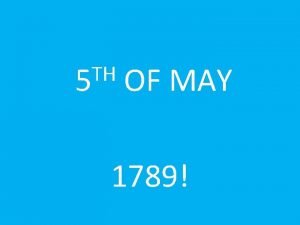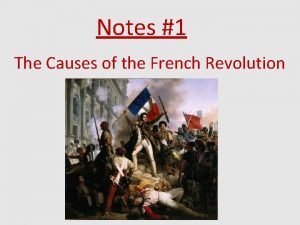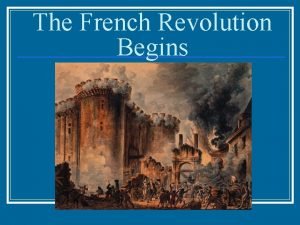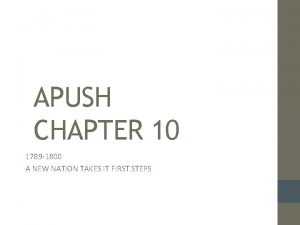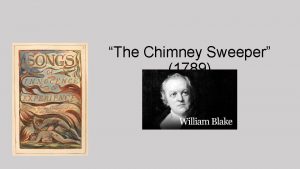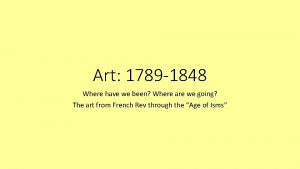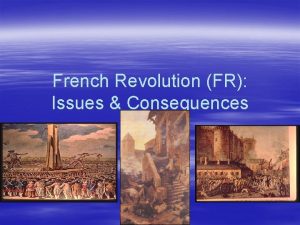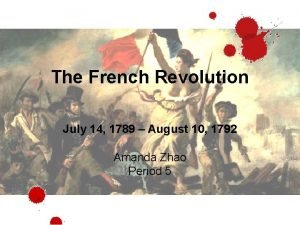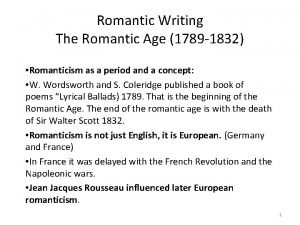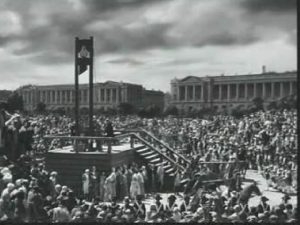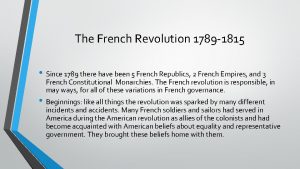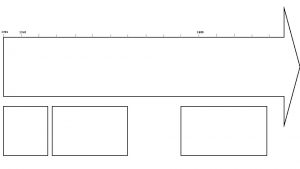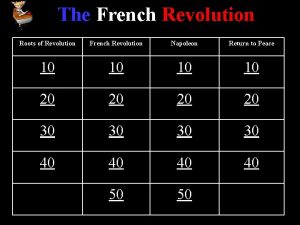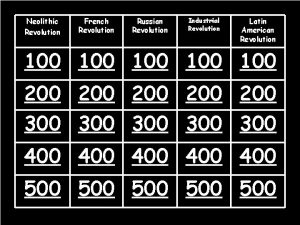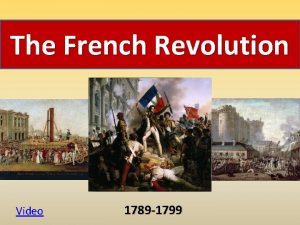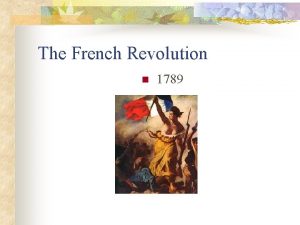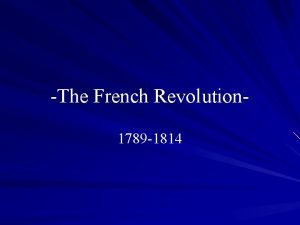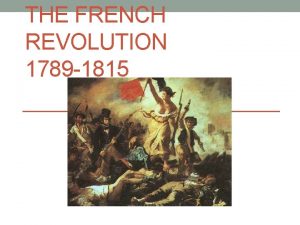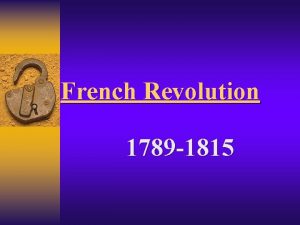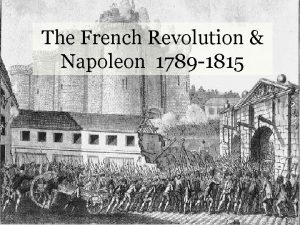TH 5 OF MAY 1789 THE FRENCH REVOLUTION























- Slides: 23

TH 5 OF MAY 1789!

THE FRENCH REVOLUTION UNIT 3 AREA OF STUDY 1: REVOLUTIONARY IDEAS, LEADERS, MOVEMENTS AND EVENTS WEEK 4: The Writing of the Cahiers, elections to the Estates-General and the ‘doubling of the third’

RECAPPING CONTENT BEFORE CAMP… Document available web page

Learning Outcome: Provincial elections and the writing of the Cahiers de Doleance • Understand how members from the clergy, nobility and third estate elected members to represent them at the Estates-General • Understand the key demands of the book of grievances • Understand the difference between voting by head or by order • Explain how the issue of voting by head or by order contributed to a revolutionary situation • Explain the role played by Jacque Necker in the Estates General

BUT FIRST THE CONTEXT…. FAMINE AND THE HARVEST CRISIS(1788 – 1789) • Estates-General created social optimism, especially in peasants • The food crisis had left many hungry and desperate. Would the Estates-General bring about a change for the average French person?

FAMINE AND THE HARVEST CRISIS The poor people seem poor indeed; the children terribly ragged, - if possible, worse clad than if with no clothes at all; as to shoes and stockings, they are luxuries. A beautiful girl of six or seven years playing with a stick, and smiling under such a bundle of rags as made my heart ache to see her. They did not beg, and when I gave them anything seemed more surprised than obliged. One third of what I have seen of this province seems uncultivated, and nearly all of it in misery. What have kings, and ministers, and parliaments, and states to answer for their prejudices, seeing millions of hands that would be industrious idle and starving through the execrable maxims of despotism, or the equally detestable prejudices of a feudal nobility. (Arthur Young in Brittany 1788) • 13 July 1788: A savage storm devastated crops in the Paris Basin region • A shortage of grain lead to high rises in the price of bread • By July 1789, typical urban working families were spending 30% - 50% of income on bread. • Peasant families were spending more: 65% to 90% of income on basic food. Starvation became a threat • Demand for other industrial consumer good s drops, devastating economy

REVEILLON RIOTS (April 1789) CLASS CONFLICT: ‘Death to the rich’ indicates a growing awareness of inequality of ancien regime ‘The crowd created a mock gallows and a placard which read ‘Edict of the Third Estate, which judges and condemns the Above Réveillon. . . To be burned and hanged in a public square’ (Fenwick and Anderson 2006: 64). CLASS CONFLICT: ‘Propertied classes’ form a militia to prevent further threats to property • Owner of the Reveillon wallpaper factory argued for deregulation of the price of bread to bring prices down. Misinterpreted as suggestion that wages should go down • 3000 gather in protest, shouting ‘Death to the rich, death to aristocrats’ • Looting and destruction of possessions occur • 25 were killed by French Guards’ fire, and 300 were injured

CONSULTING THE NATION: PROVINIAL ELECTIONS AND CREATING THE CAHIERS de DOLÉANCES Cahiers de doléances: lists of grievances drawn up by each of the three Estates in France, between March and April 1789.

CONSULTING THE NATION: PROVINIAL ELECTIONS AND WRITING THE CAHIERS de DOLÉANCES ‘The calling of the Estates-General required the electing of deputies and the drawing up of lists of grievances to be presented at the meeting a Versailles’ (Adcock 2006: 52) THE PROCESS FOR NOBLES • Attended their local main town • Elected deputies for Estates-General DRAFTING THE GRIEVANCES • Here they also added to a list of grievances

CONSULTING THE NATION: PROVINIAL ELECTIONS ANDWRITING THE CAHIERS de DOLÉANCES ‘The calling of the Estates-General required the electing of deputies and the drawing up of lists of grievances to be presented at the meeting a Versailles’ (Adcock 2006: 52) THE PROCESS FOR THE CLERGY • Had preliminary meetings in religious chapter who then went to the main town • Here clergy representatives were voted for that province DRAFTING THE GRIEVANCES • When high clergy drafted grievances they generally defended their privileges • When village priests controlled the process they suggested liberal reforms

CONSULTING THE NATION: PROVINIAL ELECTIONS AND WRITING THE CAHIERS de DOLÉANCES ‘The calling of the Estates-General required the electing of deputies and the drawing up of lists of grievances to be presented at the meeting a Versailles’ (Adcock 2006: 52) THE PROCESS FOR THE THIRD ESTATE AND DRAFTING THE GRIEVANCES • Complex due to size and the fact that many were illiterate • Meetings in thousands of French villages and towns collected peasants grievances in dossiers • Dossiers sent to a meeting where grievances were summarised into one dossier, and candidates for the Estate-General were elected • Then met at the local town where the educated middle class summarised grievances into one document. Delegates for the Versailles meeting were elected. • The grievances put forth at the Estates-General were bourgeois rather than peasant

CONSULTING THE NATION: WHAT THE CAHIERS de DOLÉANCES GENERALLY REQUESTED The Cahiers de doléances sought the following reforms: • Political reform: Legislative powers belong with the nation and the King through the Estates-General, not just the King. There is a strong voice for the establishment of a constitution • Administrative reform: Provincial assemblies have a greater role in tax collections, spending and that public servants should have a greater role • Legal and judicial reform: Call for more efficient judicial system, more humane forms of punishment, that law respects the rights of the accused and freedom of speech, and the abolition of the lettres de cachet • Fiscal reform (taxation): There should be changes to the taxation system. : Through Estates General. National control of spending. Agreement on the labour tax (corvée) and the removal of internal tax barriers (eg: gabelle).

NOBILITY MORE REVOLUTIONARY THAN BOURGEOISIE? Chartier and Taylor argue: • The Third Estate did not produce the most revolutionary grievances • Privileged orders did not always protect their own interests • Of the 270 nobles elected for the Estates-General, one-third were liberals • Demand for a constitution: 57% Third Estate, 64% Nobility

Elections to the Estates General and the Cahiers de Doleances 1. To what extent did the process of the drafting of the cahiers represent the grievances of lower third estate? Explain you answer 2. Why did the demand for a constitutional monarchy come more strongly from the noble rather than the third estate cahiers? Include a discussion of the Nobility of the Robe in your answer.

How would they vote on these issues?

TH 5 OF MAY 1789!

HOW WOULD THE ESTATES-GENERAL RUN? • At the last meeting in 1614 (voting by ‘order’): Shared interests to protect privileges 1 st Estate Clergy: 2 nd Estate Clergy: 3 rd Estate: 300 members vote on issue, majority rules 1 vote

HOW WOULD THE ESTATES-GENERAL RUN? ALTERNATIVE METHOD OF DOUBLING THE THIRD ESTATE • Inspired by voting system in the provincial assemblies between 1778 and 1787 • Number of representatives in Third Estate doubled in recognition of its size • Voted by ‘head’, not by ‘order’ • Provincial assembly of Vizille suggested this for Estates-General. How did it work?

HOW WOULD THE ESTATES-GENERAL RUN: ALTERNATIVE METHOD • Recommendation to vote by ‘head’: 1 st Estate Clergy: 2 nd Estate Clergy: 3 rd Estate: 300 members vote on issue 600 members (DOUBLING OF THE THIRD) vote on issue 300 votes 600 votes Majority rules

Parlements lose the people’s faith • The issue of voting by head or by order caused a great split between parlements and third estate • Pamphleteers were spreading propaganda about the importance of voting by head: ‘voting by order was a deliberate attempt by the privileged orders to keep Third Estate in subjection’ (Adcock 2009: 63) • Nobles were demanding voting by order • Magistrates of parlements supported voting by order: their popularity with the Third Estate immediately dissapears!

NECKER’S INDECISION (DECEMBER 1788) • September 1788: Necker replaced Brienne as Louis XVI believed he was the only person who could control the people. In December 1788 he: Ø Doubled the Third Estate’s representation at the Estates. General ØRefused to implement voting by head! ØDecided that the decision on voting by head or order was to be resolved at Estates-General

Class discussion • How did the members from the clergy, nobility and third estate elected members to represent them at the Estates. General? • What were the key demands of the book of grievances (cahiers de doleance)? • What was the between voting by head or by order? • How did the issue of voting by head or by order contribute to a revolutionary situation? • What role did Jacque Necker play in the Estates General?

TH 5 OF MAY 1789!
 5th may 1789
5th may 1789 Immediate cause of french revolution
Immediate cause of french revolution Causes of french revolution
Causes of french revolution The tennis court oath
The tennis court oath Russian revolution vs french revolution
Russian revolution vs french revolution Did american revolution cause french revolution
Did american revolution cause french revolution French revolution political cartoon
French revolution political cartoon Third agricultural revolution definition
Third agricultural revolution definition 1789 apush
1789 apush 1789 france
1789 france Louis xiv en costume de sacre symboles
Louis xiv en costume de sacre symboles The divisions in spanish colonial society 1789
The divisions in spanish colonial society 1789 French revolution symbol
French revolution symbol Against the gods 1789
Against the gods 1789 Sistema internacional clasico
Sistema internacional clasico Napoleon 1789
Napoleon 1789 1797 - 1789
1797 - 1789 Chimney sweeper songs of innocence
Chimney sweeper songs of innocence Art 1789
Art 1789 Europa en 1789
Europa en 1789 Europe in 1789
Europe in 1789 July 14 1789
July 14 1789 Bolton romanticism amp; politics 1789 1832 download
Bolton romanticism amp; politics 1789 1832 download 1789
1789
